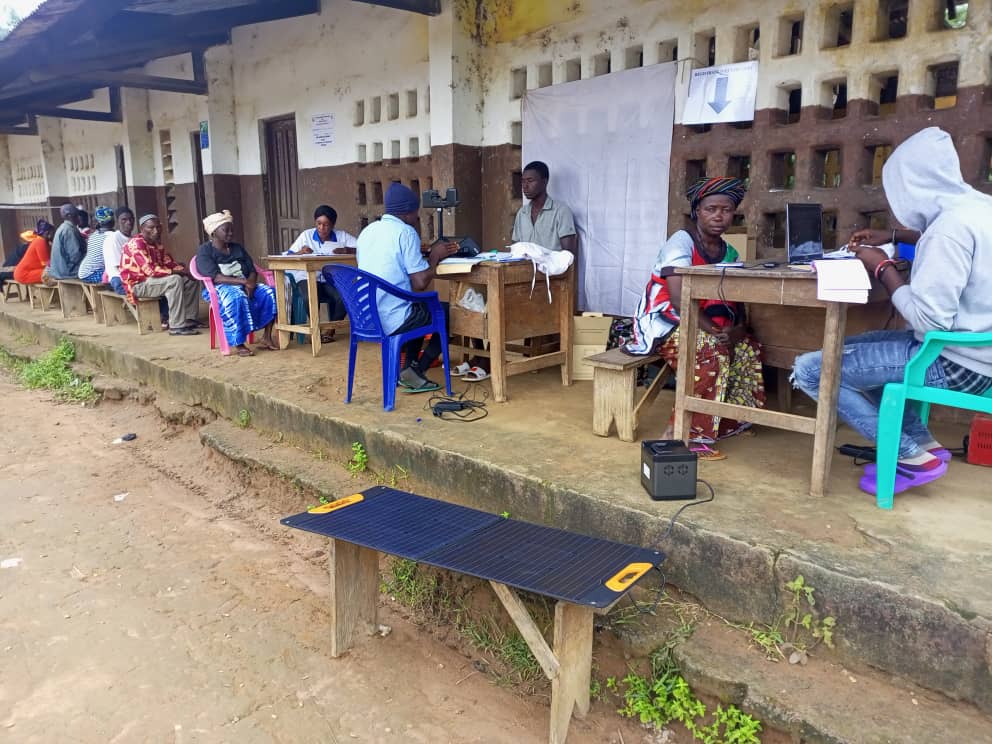The registration of voters for next year’s public elections has had a bumpy start. In the first week, staff contended with malfunctioning kits and other logistical problems, while many registrants were left either frustrated or confused. This delivery is clearly the product of a not-so-well-planned exercise by the Electoral Commission for Sierra Leone (ECSL). Sorry, but that is our impression.
Take away the suspicion of opposition parties and supporters who suggest that the process may have been skewed against them, there are very legitimate concerns. Independent groups have pointed out some of the issues that have marred the initial stages of the registration process. National Elections Watch (NEW), a coalition of civil society groups that monitors elections in the country, highlighted issues ranging from faulty registration kits to logistical challenges that caused some centres to delay the exercise. In some locations, the first day went by without any registration at all.
Although the process is said to have improved at many centres and more people are being registered around the country, it is important to do a real-time examination of the ECSL’s preparedness and what it means for the rest of the electoral process.
We do acknowledge that exercises such as the registration of voters can be very complex logistical operations. And the introduction of new systems can further complicate matters. That said, the ECSL should have anticipated the challenges and thought about ways of addressing them. Dispatching registration materials on the eve of the commencement of registration leaves little or no room for manoeuvre if anything goes wrong. And machines not powering on upon command also suggests that some of the kits were not tried and tested to ascertain their operability. These seem like very foundational issues that the ECSL should have had under control. A dry-run or mock registration exercise—even a tabletop format—could have exposed the ECSL staff to the challenges before deployment and registration. They probably did. And if they did, how do you end up with a malfunctioning or dysfunctional kit?
Apart from the technical and logistical issues that created delays and inconvenience, the ECSL did not seem to have invested enough time and resources into public information and education. The registration has been split into phases. New elements have been introduced. This means, that more time and resources ought to have been allocated to informing the public about what they need to know and do to get registered. There have been indications of a clear lack of education of registrants and that too is a situation that does not only create confusion and frustration but suspicion as well.
The ECSL must understand that its operating environment is engulfed in deep political polarization and mistrust. Next year’s elections are expected to be hot contests. The outcome of the census was not well received by many Sierra Leoneans who up till now argue that the results are not a true reflection of the real demographics. The amendment of the Public Elections Act was also another contested and acrimonious process that pitted the various political interests against each other, with independents also weighing in on the proposed amendments. All of these should give the ECSL a good sense of things to come and urge them to be as meticulous as they can be to ensure that the elections are smooth.
The electoral process has multiple steps—all of them interlinked and contribute to a free and fair outcome. The ECSL is definitely aware of this and must therefore appreciate that foundational challenges such as the ones that affected the smooth registration of some voters last week can undermine the entire electoral process if they do not bring the situation under control.
We are hoping that while the ECSL try to fix the current issues with the registration of voters, they are also taking stock and learning from their mistakes. At some point, if the issues persist, they should be able to determine whether an extension of registration is required. Public education and information; explaining the new model of voter registration will also be key in making the work of the ECSL a lot less complicated and averting some of the issues we saw in Week One. The political parties should also be concerned with the education of their supporters and potential voters, and this should include where and when to register. It is not enough to print out flyers and posters encouraging people to go out and register. The “how?” and “when?” part of it must be the business of political parties because, at the end of the day, they are going to be campaigning for those votes.
The ECSL must appreciate that it is not only the elections, but the peace and stability of the nation is also in their hands. Therefore, they must do the right thing and continue to engage the public and political parties to avoid a situation where they will have to deal with contestations and disagreements that could have been avoided. The elections chief and his senior staff will leave a mark on the nation in the coming elections. It is for them to decide and be deliberate about what kind of mark they would want to make and what kind of legacy they wish to leave.
Whatever you are up to this weekend, make sure you register to vote even if you are undecided about who to vote for.


